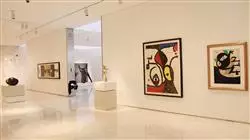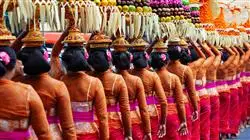University certificate
The world's largest faculty of journalism and communication”
Why study at TECH?
Cultural information is in high demand among the public, interested in learning about the customs and traditions of other countries. Specialize in this sector and give your profession a boost"

Cultural journalism has traditionally had a prominent presence in the media, but it has usually been a discipline far from academia. In other times, professionals who have had a journalistic career in the area have been learning through practice with very few educational proposals. Nowadays, formation is essential in any sector.
This course has an eminently professional orientation, and seeks to train cultural journalism professionals who are capable of responding to the demands of the market. Journalists specialized in specific fields are needed in response to the growing segmentation of the public targeted by today's media. The field of cultural specialization is relevant because of the growing importance of the sector referred to cultural management and creation and, above all, because of the incorporation of culture into the digital sphere.
The objective of this program is to broaden the student's skills with a high level of deepening in the field of cultural journalism, which qualifies the student in the informative and dissemination functions in the professional environment, with special emphasis on the particularities of the media.
And all this in a specialization of excellent academic level, created by specialized professionals with years of experience and, above all, with a 100% online format that will allow you to organize your study in a simple way, so you can combine it with the rest of your daily obligations.
This program will allow you to increase your ability to succeed. Reach a higher level of professionalism in communication through the latest educational technology 100% online"
This Postgraduate certificate in Cultural Information in the Media contains the most complete and up-to-date academic program on the university scene. The most important features of the specialization are:
- The development of practical cases presented by experts in cultural journalism
- The graphic, schematic, and practical contents with which they are created provide scientific and practical information on the disciplines that are essential for professional practice
- News on cultural information in the media
- Practical exercises where self-assessment can be used to improve learning
- Algorithm-based interactive learning system for decision-making in the situations that are presented to the student
- Its special emphasis on innovative methodologies in the creation of cultural information
- Theoretical lessons, questions to the expert, debate forums on controversial topics, and individual reflection assignments
- Content that is accessible from any fixed or portable device with an Internet connection
This course is the best investment you can make in the selection of a professional program to improve your knowledge in Cultural Information in the Media"
It includes in its teaching staff professionals belonging to the field of cultural journalism, who pour into this course the experience of their work, in addition to recognized specialists from reference societies and prestigious universities.
The multimedia content, developed with the latest educational technology, will provide the professional with situated and contextual learning, i.e., a simulated environment that will provide an immersive learning experience designed to prepare for real-life situations.
The design of this program focuses on Problem-Based Learning, by means of which the journalist will have to try to solve the different situations of professional practice that are presented to them. To do so, the specialist will have the help of an innovative interactive video system created by recognized experts in Cultural Information in the Media, and with great experience.
Increase your confidence in decision making, reinforcing your knowledge through this course"

Learn about the latest trends in the field of cultural journalism and improve communication processes in all journalistic media"
Syllabus
The structure of the contents has been designed by a team of professionals in cultural journalism in the national territory, aware of the relevance of current affairs in order to produce publications of academic quality, and committed to quality teaching through new educational technologies.

This course contains the most complete and up-to-date scientific program on the market, designed to help you achieve professional success"
Module 1. Cultural Information in the Press
1.1. Cultural Agenda Assessment of the Informative Fact
1.1.1. Assessment of the Informative Fact
1.1.2. Press Cultural Information
1.1.3. Cultural Agendas: Examples
1.2. Informative Genres in Cultural Journalism
1.2.1. The News
1.2.2. The reportage and the objective interview
1.2.3. Documentation
1.3. Elements of Titling The Wording of the Headline Basic Writing Rules
1.3.1. Elements of Titling
1.3.2. The Wording of the Headline
1.3.3. Basic Writing Rules
1.4. The Origin and Functionality of the First Paragraph Basic Rules for Writing the First Paragraph of the News
1.4.1. The origin of the first paragraph
1.4.2. The functionality of the first paragraph
1.4.2. Basic Rules for Writing the First Paragraph of the News
1.5. Style Books Journalistic Style Content Structuring
1.5.1. Style Books
1.5.2. Journalistic Style
1.5.3. Content Structuring
1.6. Cultural Journalism Writing Workshop
1.6.1. Interview Analysis
1.6.2. Analysis of Reports and Chronicles
1.6.3. Analysis of Reviews, Critical Reviews, Opinion Articles and Opinion Columns
Module 2. Cultural Information on the Radio
2.1. Characteristics Compared to Other Media
2.1.1. The Origin of the Radio
2.1.2. Characteristics Compared to Other Media
2.1.3. The Role of Radio Currently
2.2. Radio Language
2.2.1. What Language Allows Radio to Do
2.2.2. Accent on the Radio
2.2.3. The Retransmission of Events
2.3. Synopsis and Headlines or Summaries
2.3.1. Information Spaces
2.3.2. Listener Participation in Information Spaces
2.3.3. New Technologies in Radio
2.4. Report and Interview
2.4.1. The Report
2.4.2. The Interview
2.4.3. Creation of the report and the radio interview
2.5. Radio Fluency
2.5.1. Radio Voice-Over
2.5.2. Vocal moderation
2.5.3. Repetition
2.6. Tools for Cultural Journalists in Radio
2.6.1. Radio Script
2.6.2. Radio Documentation
2.6.3. Style Manuals
Module 3. Television Culture
3.1. Basic Concepts and Differences with Radio and Other Media
3.1.1. Basic Concepts of Television Production
3.1.2. Difference With Film
3.1.3. Difference with Radio and Other Media
3.2. Production in the Studio
3.2.1. Particularities of Studio Recording
3.2.2. Functions of the Production Professional
3.2.3. Other Personnel and Technical Equipment
3.3. Multi-Camera Techniques
3.3.1. Differences with Respect to Single-Camera Production
3.3.2. Camera Triangle
3.3.3. Live Television
3.3.4. The Play-List
3.3.5. Magazines, the Debate, the Interview... the Staging
3.4. Introduction to Documentaries
3.4.1. Documentary and Journalism
3.4.2. Interaction with Reality
3.4.3. Documental de creación
3.5. Reporting
3.5.1. Audiovisual Cultural Journalism
3.5.2. Report, News and Editing
3.5.3. Features of the Report
3.6. The Documentary-Report Project
3.6.1. Introduction
3.6.2. Plot
3.6.3. Context
3.6.4. Synopsis and Structure
3.6.5. Form and Style
3.6.6. Public

A unique training experience, key and decisive to boost your professional development"
Postgraduate Certificate in Cultural Information in the Media
If you are passionate about the media, but you are also a lover of culture, this TECH online program is for you. The Postgraduate Certificate in Cultural Information in the Media, is an academic program that focuses on providing students with solid training in the field of culture and its relationship with the media. This is of great relevance in today's society, since culture plays a fundamental role in our daily lives and the media are the main channels for its dissemination. First of all, it is important to emphasize that culture is an essential element of a society's identity. It defines us as individuals and allows us to understand and appreciate the differences between people. Knowledge of culture is fundamental for harmonious and respectful coexistence in an increasingly diverse society. Therefore, it is crucial that media professionals are well prepared to adequately and accurately convey this cultural information.
Take your art to the top by studying at TECH
The media play a crucial role in the dissemination of culture. Through them, different cultural expressions such as music, cinema, literature and art, among others, are presented and promoted. These media have the capacity to reach a large audience and, therefore, have a significant influence on society's perception and appreciation of culture. That is why it is important that media professionals are trained to address these issues in an appropriate and enriching way. The Postgraduate Certificate in Cultural Information in the Media is of vital importance in today's society. It contributes to prepare professionals who are capable of transmitting culture in an adequate and respectful manner, as well as promoting and disseminating different cultural expressions. This not only enriches our daily lives, but also contributes to the development and preservation of our cultural identity.







